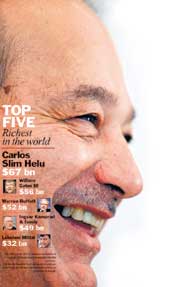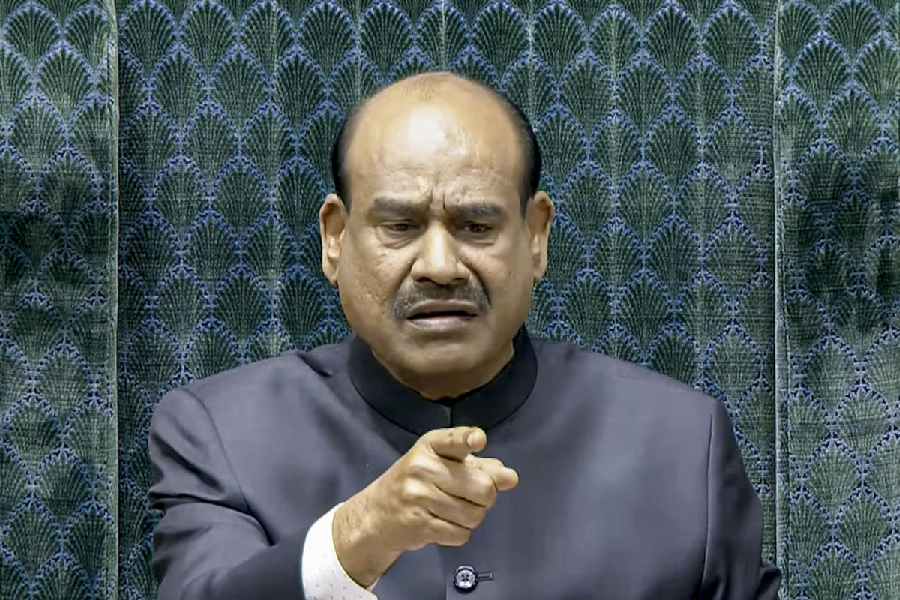 |
Has the crown been plucked from the not-so-boyish mophead of William Henry Gates III? Could it be that the world’s most famous nerd is no longer the wealthiest individual in the entire planet?
That’s how it looks this week. After 13 long years as the reigning monarch of the wealth stakes Bill Gates is no longer billionaire Numero Uno. He has been deposed by an unlikely figure — a jowly Lebanese Mexican telecom magnate named Carlos Slim Helu who is probably worth around $67 billion and counting. “I think it’s a safe bet that Bill Gates isn’t the world’s richest man any longer,” says Philip Beresford, who compiles The Sunday Times Rich List.
Did someone say Slim who? You probably wouldn’t ask that question if you lived in Mexico or one of its South American neighbours where he’s the local equivalent of Sunil Mittal without the competition.
Slim is the region’s most powerful telecom czar and his telephone wires and wireless towers stretch out all through Latin America. His mobile phone company America Movil owns 90 per cent of Mexico’s mobile connections and another company Telmex has an equally powerful stranglehold on all calls made and received on the country’s landlines. Slim is also the man at the telephone exchange in countries like Peru and the Dominican Republic and he has a chain of businesses from department stores to restaurants.
But let’s say that Bill Gates had it coming. If it hadn’t been Slim it would have been one of the other tycoons who’ve been amassing wealth at an extraordinary speed in the last two or three years.
Heck, it might even have been our own Lakshmi Mittal — who Calcutta can still claim as one of its native sons —whose wealth has been rising in leaps and bounds as the price of steel soared and he raced from one bigger acquisition to another.
Back in 2005 Mittal was a mere also-ran billionaire worth about $7 billion and a spot of change. But by 2006 he was forging ahead of the field and had added about $18 billion in a year taking him to the 5th spot in the wealth charts. Now, after another year of frenetic activity he’s still in 5th place but his personal wealth has climbed to $32 billion according to Forbes magazine, the bible of wealth calculation.
Alternatively, if Gates had peeped into his rear view mirror he might have spotted a crowd of Russian-looking gentlemen gaining on him. Out in front it might might have been Roman Abramovich, famous round the globe as the owner of Chelsea Football Club and one of the world’s largest yachts. Abramovich’s great riches come from Sibneft, the Russian oil company which he traded in a few years ago for about $13 billion. Since then he has been picking up stakes in scores of Russian companies and is reckoned now to be worth about $18 billion.
But don’t look only at Abramovich. Russia, where the state once owned almost everything, now has 53 billionaires with their sprawling dachas, vulgarly oversized yachts and strings of homes across Europe. There are other less splashy figures like Vladimir Lisin who’s worth about $14 billion or Vladimir Potanin, a mining and lumber tycoon, worth about $13.5 billion.
There’s a pattern out here that isn’t tough to spot. The newly-minted billionaires are coming not from the US of A where most of the world’s stupendously rich have traditionally been found. Yep. You guessed it: they are coming from the new powerhouses of fast economic growth like Mexico, Brazil, Russia, China and India. Says Beresford: “This is the rise of the BRIC billionaires, if you count Mexico as a part of the BRIC countries. These countries are going to take over the wealth charts and this is the first sign of it.”
That’s already happening and it’s giving the wealth charts an entirely new look. India, for instance now has 36 colossally rich billionaires out of whom 14 have risen to ‘billionairedom’ in the last 12 months. And chart-toppers like the Ambani brothers appear to have profited by going their own respective ways. Together the brothers are worth a stupendous $38 billion which makes them one of the world’s richest families.
Cross to Russia and the picture of unbridled wealth is even more astonishing with its 53 individuals who’ve crossed the billion mark. That’s just two short of Germany and far ahead of a G-7 nation like Canada which has only 24. China’s not so big in the billionaire stakes with only about 20 but the picture changes if you add the 21 from Hong Kong.
There are other seismic changes taking place in the world of wealth. Back in the early ‘90s Japanese property tycoons lorded it as the world’s richest men. They were swept away when the property bubble burst and the Japanese economy tanked. They were replaced by the software and hi-tech stars like Gates and Larry Ellison of Oracle.
Now the baton’s finally being handed on from the hi-tech tycoons. They are being replaced by old-fashioned manufacturing kings like Mittal and Abramovich who’ve made their money in steel and oil — which are in short supply with countries like China developing an insatiable appetite for these products.
In fact, four out of Russia’s top six billionaires are getting their wealth from old-fashioned industries like steel, aluminium and metals that were once considered sunset sectors and scorned by investors globally.
But let’s get one thing straight. Carlos Slim wouldn’t have climbed so high in the wealth stakes if the Mexican stock market hadn’t been rising. Sentido Commun, the financial website which pronounced him the world’s richest man this week, pointed out that the share price of his America Movil had climbed 27 per cent in recent months and that Telmex had moved up by 10 per cent. By contrast, Microsoft shares had only risen about 5 per cent.
Keep in mind that cash is flowing into markets like Mexico, India and Russia from investors in the First World who’ve suddenly figured that emerging markets are a profitably and not too risky bet.
At an entirely different level, don’t forget the charity factor. Gates is now giving away substantial chunks of his wealth to charitable causes. Says Beresford: “He puts the money in a charitable trust and says it’s not mine any more. As a result it’s not counted as his wealth and he’ll start going further down the list.”
But, in the end it’s all about economic growth. Says Beresford: “It’s inevitable that personal wealth accumulation will follow on from economic growth. They are hand in glove.”










